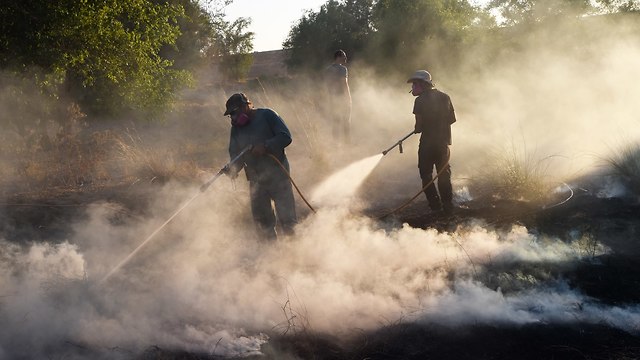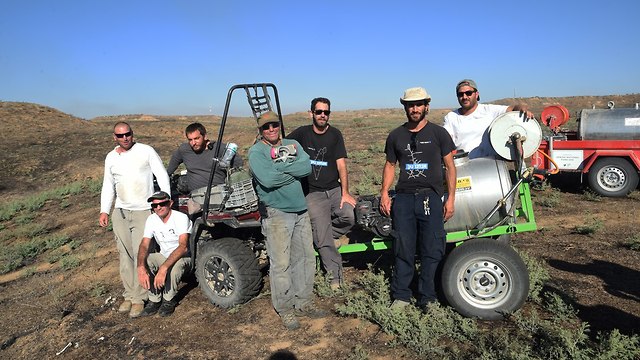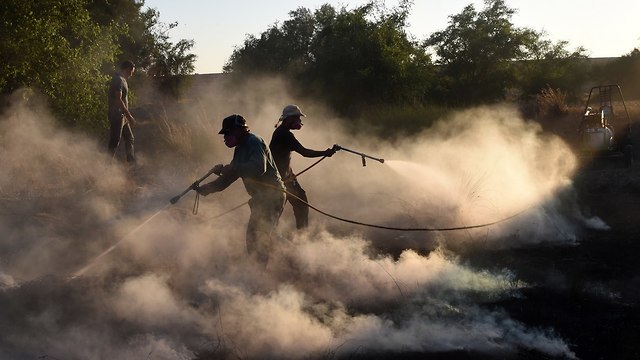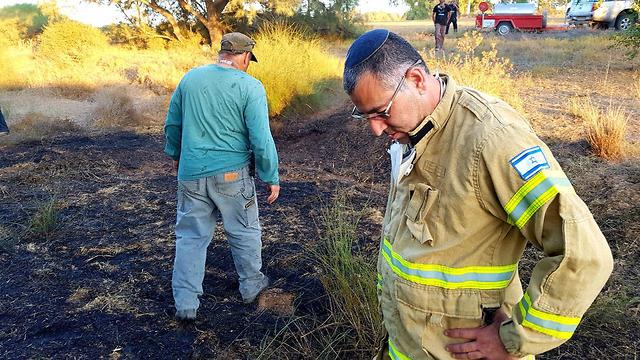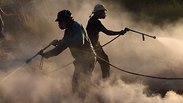
Volunteers who battle kite and balloon fires
Group consists of volunteer firefighters, students, farmers and executives who left everything to protect their home in Kibbutz Be'eri from the kite terror from Gaza; ‘Sometimes firefighting crews arrive after I’ve already put out the fire,’ says volunteer.
"Sometimes firefighting crews arrive after I’ve already put out the fire," he says, laughing. "I tell them 'Everything is under control. Go look for another fire.’
Rami is not alone, however. Together with a team of volunteers that he established in the kibbutz, he and his friends fight the arson terror and rush towards any cloud of smoke in the area that raises their suspicion.
In order to deal with the kites and balloons terror, which the Gaza border communities have been suffering from for months, the residents of Be'eri—the territories of which have recorded the largest number of fires in the region—decided to do something about it. Their solution is to guard and observe the area doing shifts in order to assist firefighting crews to put out the flames.
There are two shifts, one in the morning from 10 AM to 4 PM, and one in the evening from 4 PM until the last fire. The means at the team's disposal are two SUVs, an ATV and four volunteers during each shift.
An average of five fires break out in a day in the Be'eri area. There is also a supervisor that overlooks each shift. Evyatar Kipnis, a resident of the kibbutz manages the shifts through Whatsapp.
Hagai Hecker was appointed as "Operations Man". He is responsible for calling up the volunteers on duty, and establishing a connection with the IDF, the firefighting forces, the Nature and Parks Authority and the KKL. He is on call 24 hours a day and scarcely has a moment of rest.
"We’re really lucky that there are enough volunteers from the kibbutz. All of them are equipped to extinguish fires, and oftentimes there are several blazes simultaneously. It is exhausting but it will not break us," he said. "There is camaraderie here, like in the military."
On Tuesday, two young Be’eri residents, Eden Askapa and Jordan Tzemach, started their evening shift and were immediately called on the scene of the fire in the Be’eri crater, which was started by an incendiary balloons.
The two entered their vehicle and called their friend Hen Even as reinforcement. He arrived with his Chevrolet dragging a water trailer behind. “We are saving our homes,” said Askapa on his way to the fire. “If we don’t do it we would have to live in a cloud of smoke or worse, the fire would spread to the Kibbutz. But saving nature is no less important. The name of the game is to arrive as fast as possible to the scene of the fire and prevent its spreading. Every moment is critical.”
After putting out the fire in the crater they ascended a KKL observation tower to meet with firefighters. The coffee was already prepared. The observer at the top of the tower called out the launching of incendiary balloon sightings every few minutes and the forces were alert. “The wind is against us,” he said from behind the telescope. “This can cause the fire to spread rapidly.”
Hecker asks the two volunteers to be on alert. Shortly after 6 PM the observer reports seeing smoke. They jump into their vehicles and head to the scene of the fire that began to spread in a wooded grove about a kilometer from the Kibbutz. The fire was relatively small and they completed their work within a short time.
“We are dealing with a bizarre reality but we learnt how to be efficient,” concludes Kipnis. “This struggle brought us together and created amazing cooperation between various bodies and connections between great people who just want to protect their homes.”










